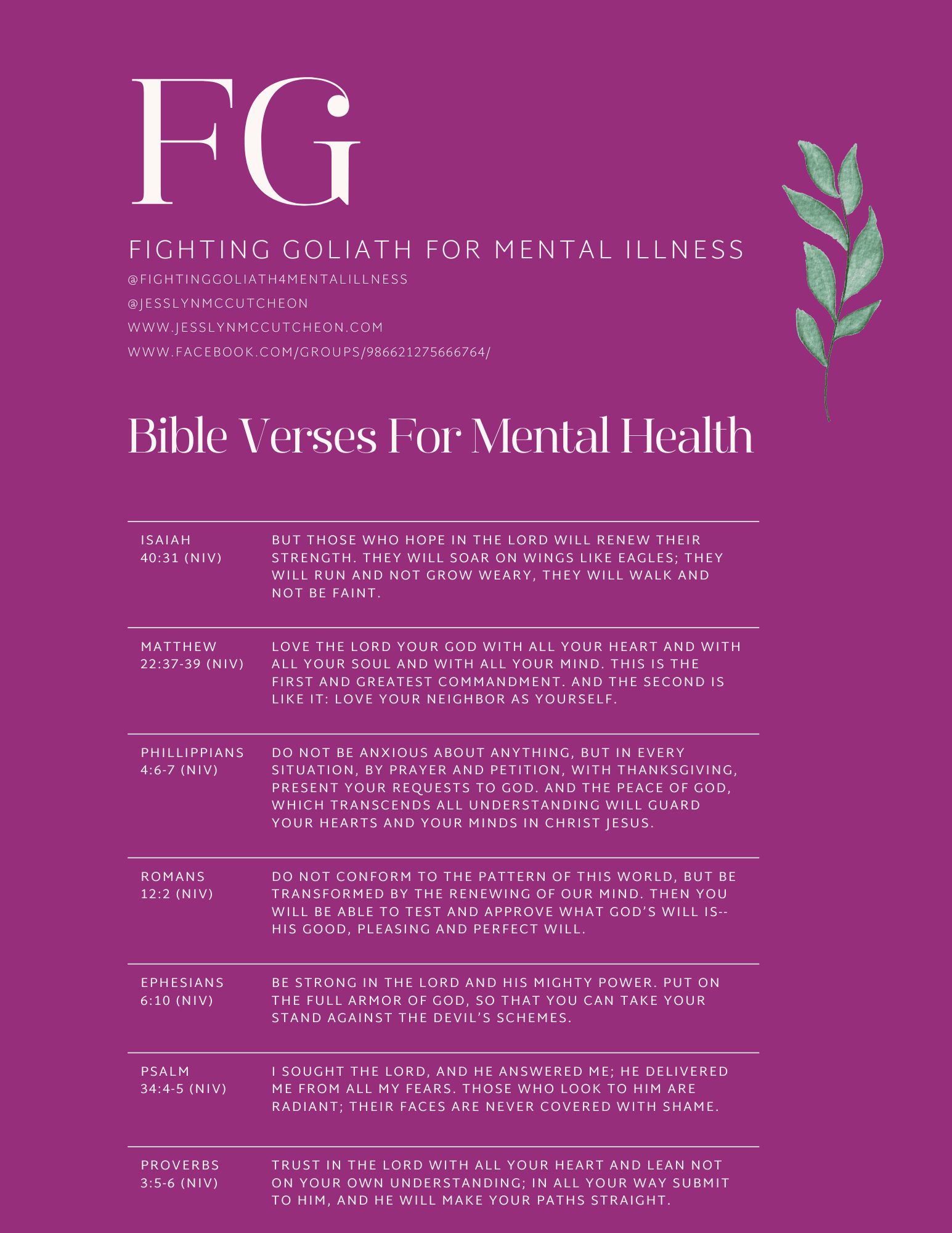Mental Health Resources
Discover a wealth of support and guidance at Fighting Goliath for Mental Illness. Jesslyn McCutcheon empowers individuals, caretakers, and practitioners with valuable mental health resources and links, fostering education and understanding.
“You don’t lose if you get knocked down; you lose if you stay down.” — Muhammad Ali
- Monarch
Behavioral Health Outpatient Office–Forsyth County
4140 N. Cherry St.
Winston-Salem, NC 27105
(336) 306-9620
M-F: 8:00AM-5:00PM
Last walk-in will be taken at 3:00PM M-F
www.monarchnc.org
- 988 Suicide & Crisis Lifeline
If you or somebody you know is in a mental health crisis, call or text 988 or chat at www.988lifeline.org to be connected to a trained crisis counselor. If you are deaf and hard of hearing, call 711. Additionally, to reach the Veterans Crisis Line, call 988, then press 1 or text 838255. Help is available 24/7.
- Peer Warmline
1-855-Peers NC (1-855-733-7762)
Available 24/7/365
- Daymark Mobile Crisis for the following counties:
www.daymarkrecovery.org
1-866-275-9552Allegany, Ashe, Avery, Cabarrus, Davidson, Davie, Forsyth, Iredell, Rockingham, Rowan, Stanly, Stokes, Surry, Union, Watauga, Wilkes, Yasmin
- www.refugewidowers.com
A faith-based ministry that offers encouragement to widowers through community and weekend retreats. This ministry is specific to widowers.
- www.griefshare.org
Support to walk alongside you through losing a loved one. Meetings are online or in person.
-
SAMHSA’s National Helpline
1-800-662-HELP (4357)
www.samhsa.gov
- NAMI National Helpline
Monday–Friday, 10:00 AM–10:00 PM EST
800-950-6264 or via webchat
Email: helpline@nami.org
Website: https://www.nami.org/help
- NAMI Teen Young Adult Helpline
Text “Friend” to 62640
Call 1-800-950-NAMI (6264)
Visit nami.org/help to access its web chat feature.
- Anxiety & Depression Association of America (ADAA)
adaa.org
- Depression and Bipolar Support Alliance (DBSA)
www.dbsalliance.org
- The Jed Foundation
jedfoundation.org
- The Substance Abuse and Mental Health Services Administration (SAMHSA)
www.samhsa.gov
-
Crisis Intervention Team (CIT)
Explain that your family member is experiencing a psychiatric emergency and that you need assistance. CIT officers are emergency response police officers who are specifically trained to de-escalate a mental health crisis.
- Mobile Crisis Unit (MCU)
MCU is a mental health emergency service offered by many (but not all) counties across the U.S. to provide on-scene evaluation, treatment, and crisis intervention in the community. For more information regarding MCU, contact 211 or conduct research for the “Mobile Crisis Unit” with your county/state.
-
National Call Center for Homeless Veterans
(877) 424-3838
www.va.gov
- The Americans with Disabilities Act (ADA)
(800) 514-0301
www.ada.gov
-
Mental Health America (MHA)
www.mhanational.org
-
Clubhouse International
www.clubhouse-intl.org
-
The National Prisoner Resource List (NPRL)
www.prisonbookprogram.org
-
Homeless Shelters Directory
www.homelessshelterdirectory.org
- The US Department of Health and Human Services
www.hhs.gov
- The American Foundation for Suicide Prevention
www.nationalhealthcouncil.org
- NeedyMeds
(800) 503-6897
It offers financial assistance programs to help cover the cost of medication.
- Medicare Rights Center
(800) 333-4114
- America’s VetDogs
www.vetdogs.org
- Sid’s House
www.sidleemha.org
- The Faith to Flourish
thefaithtoflourish.com
- Wondherful, Mental health intervention, Suicide prevention
wondherful.com
- The American Foundation for Suicide Prevention (AFSP)
afsp.org
1-888-333-AFSP (2377)
- National Institute of Mental Health (NIMH)
nimh.nih.gov
- Celebrate Recovery (Christian Based)
celebraterecovery.com
- PTSD Foundation of America
ptsdusa.org
832-912-4429
PTSD Screening: mhascreening.org
- Fresh Hope for Mental Health
freshhope.us
- Henry Amador Center on Anosognosia
hacenter.org
- International OCD Foundation
iocdf.org
617-973-5801
- Section 8
The United States Department of Housing and Urban Development (HUD) provides a number of housing assistance and counseling programs. The Housing Choice Voucher Program (Section 8) is the federal government’s program for assisting low-income families, the elderly and the disabled. Check out the Public Housing Agency to help you find public housing using the Housing Choice Voucher Program.
HUD also helps apartment renters by offering reduced rents to low-income residents. Under this program, a renter pays 30 percent of their gross adjusted income for housing and utilities. The landlord then receives a voucher from the federal government which covers the remainder of the rent.
- Section 811
The Supportive Housing for People with Disabilities Program (Section 811) is a federal program dedicated to developing and subsidizing rental housing for very or extremely low income adults with disabilities, like a chronic mental illness. The biggest difference between this program and similar ones is that it provides housing specifically for the disabled and ensures that all housing has access to appropriate supportive services like case management and employment assistance.
- Psychiatric Advance Directive (PAD)
What is it?
A psychiatric advance directive is a legal document that explains how you want medical decisions about you to be made if you cannot make the decisions yourself.



